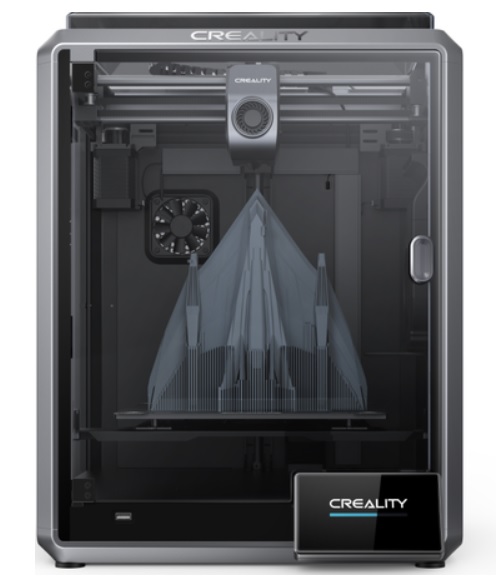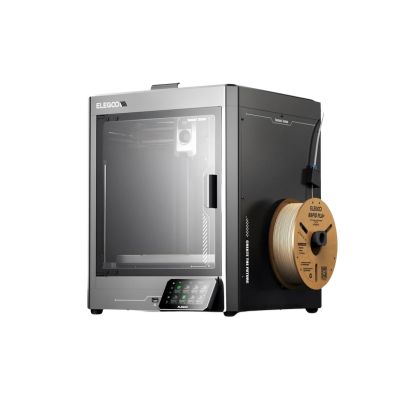Compare K1 vs Centauri Carbon
Comparison between the best 3D printers
Choose the best 3D printer at the best price. The cheapest 3D printers are here.
Buy a 3D printer here with 3D Fila.
 |
 |
|
| Model | K1[BUY K1] |
Centauri Carbon |
| Printing Material | Filament | Filament |
| Buy Filament for Creality 3D K1 | Buy Filament forElegoo Centauri Carbon | |
| Estimated price | $399,00 | $500,00 |
| Manufacturer | Creality 3D | Elegoo |
| Release Year | 2023 | 2025 |
| Print Volume [mm] | 220x220x250 | 256x256x256 |
| Printer Size [mm] | 355x355x480 | 500x500x600 |
| Weight [kg] | 12,5 | 17,5 |
| Power Loss Recovery | YES | YES |
| Enclosed printer | YES | YES |
| Bed Leveling | Automatic | Automatic |
| Filament End Sensor | YES | YES |
| Bed type | Heated | Heated |
| Power supply system | Direct Drive | Direct Drive |
| Standard nozzle | 0,4 | 0,4 |
| Maximum Nozzle Temperature [°C] | 300 | 300 |
| Maximum Bed Temperature [°C] | 120 | 110 |
| Maximum printing speed [mm/s] | 600 | 500 |
| Filament holder | YES | YES |
| Camera for supervision | YES | YES |
| Recommended filaments | ABS, PLA, PETG, PET, TPU, PA, ABS, ASA, PC, PLA-CF, PA-CF, PET-CF | PLA, PETG, ABS, ASA, TPU, NYLON, CARBON FIBER |
| Recommended slicers | Creality Print; Cura, Simplify3D e PrusaSlicer | Elegoo Slicer, Orca Slicer |
| Maximum Resolution [mm] | 0,1 | 0,1 |
| Processor | ||
| Display | Display touchscreen 4,3'' | Touchscreen 4,3'' |
| Power Supply | 110/220V / 350W | 350 W |
| Connectivity | Ethernet / USB / Wi-Fi | WiFi, SD, USB |
| Operating systems | Windows, Mac, Linux | Windows, Linux e Macbook |
| Date of registration in the system | 2023-04-17 | 2025-02-10 |
| Release date | 2023 | 2025 |
| Extra features | The K1 is an extremely fast FDM 3D printer, reaching 600mm/s, 12 times faster than standard models. Equipped with a Core XY system and lightweight print head, it offers energy efficiency and high print quality. It stands out for its dual-gear extruder and quickly heated hotend, as well as dual cooling to prevent warping. Its robust structure ensures stability at high speed, with optimized software to speed up the printing process. | The Elegoo Centauri Carbon is a CoreXY 3D printer with an enclosed structure, direct drive extruder, and hardened steel components for abrasive materials. It features automatic bed leveling, a touchscreen, a filament cutting system, and an elongated nozzle designed to reduce clogs. It offers Wi-Fi connectivity for remote file transfer and runs on a Klipper-based firmware, providing advanced control and precise adjustments. |
| Support for multiple colors and materials (AMS and CFS) | NO | NO |
Notes * |
||
| Cost-benefit | 8 / 10 | 8 / 10 |
| Hardware | 4.8 / 10 | 6 / 10 |
| Tela | . | . |
| Print volume | 3 / 10 | 4 / 10 |
| Performance | 5 / 10 | 4 / 10 |
| [BUY K1] |
Conclusion |
| In comparing the Creality 3D K1 and the Elegoo Centauri Carbon, both printers stand out in their respective features and capabilities, offering good value for different user needs. The **Creality 3D K1**, priced lower and released earlier, is designed for high-speed printing, achieving maximum speeds of 600 mm/s, which could significantly reduce production times. Its smaller print volume is still suitable for many applications, while its robust design ensures stability and quality during high-speed operations. The automatic bed leveling, dual cooling system, and a variety of compatible filaments make it a versatile choice for general users. Additionally, its lighter weight contributes to easier handling and setup. On the other hand, the **Elegoo Centauri Carbon** offers a larger print volume and is built with more heavy-duty components, making it suitable for more demanding tasks, especially with abrasive materials. Its features, including a cutting system for filament and a Klipper-based firmware for advanced control, cater to users looking for precision and increased control over their prints. While it is somewhat heavier and slightly slower, the additional capabilities in terms of material compatibility may appeal to more experienced users or those with specific project needs. Ultimately, both models showcase strengths that can meet the demands of different users. For those prioritizing speed and cost-efficiency, the K1 is an excellent option. In contrast, users needing greater volume and advanced features might find the Centauri Carbon to be a better fit, even at a higher price point. The decision should be guided by the specific requirements of the projects and the budget considerations of the users. |

